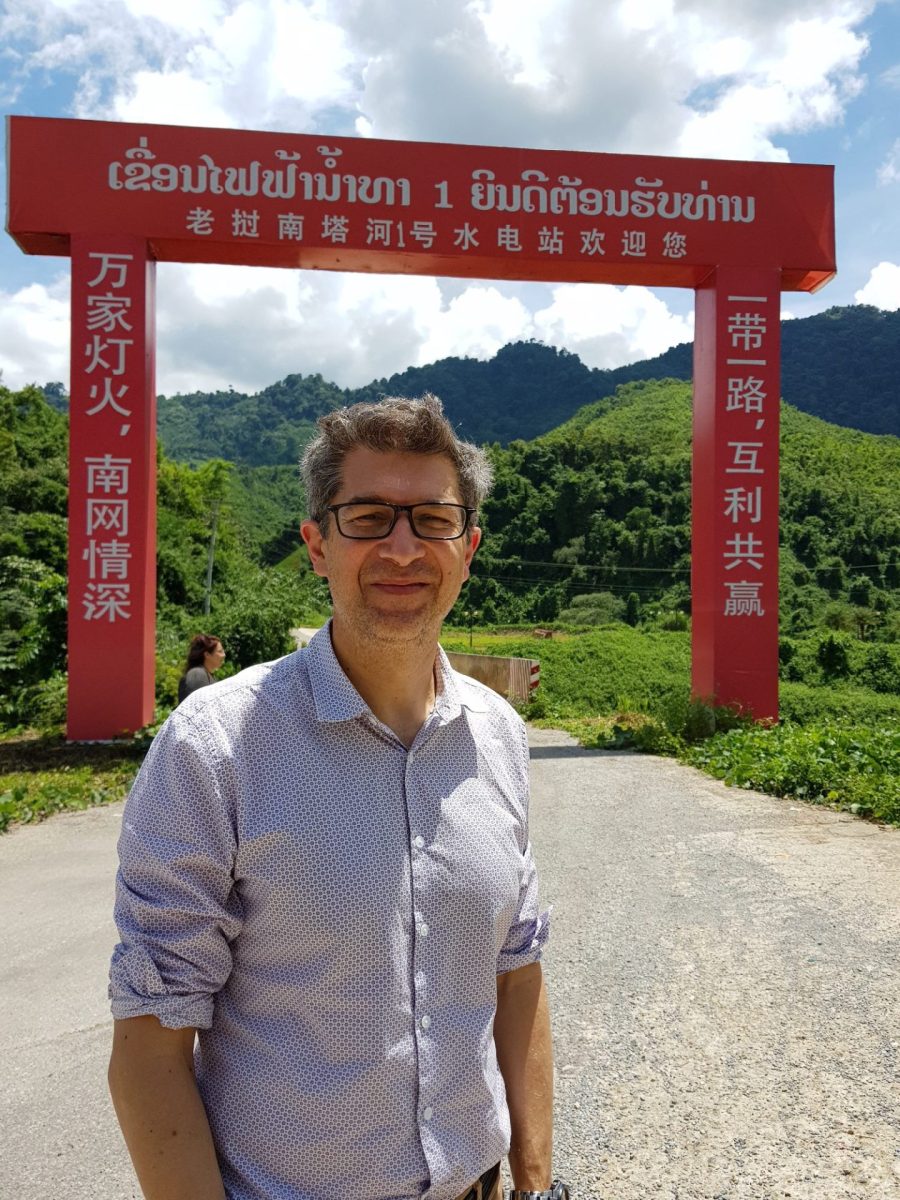RAYMOND, Gregory

VISITOR’S VOICE
Interview with Gregory Raymond ❯❯
Southeast Asian Politics ❘ Australian National University
CSEAS Visiting Research Scholar: July 2024 to January 2025
FAVORITE THINGS
Music
Music is something I love. I studied classical guitar and love playing pieces by JS Bach as well as some Spanish and South American composers. I’ve also played guitar in various bands with styles ranging from jazz to rock to klezmer. I worship the jazz greats, especially Coltrane, Miles and Thelonious Monk.
Australian Football League
I’m a passionate supporter of the working-class AFL team Collingwood. I grew up in Melbourne and everyone follows a team there. I played the game for a while but was pretty hopeless. When watching I get quite involved, and scare the cat when I yell at the TV screen.
Meditation
In my early twenties I discovered meditation through a workshop with Tibetan Buddhists based in Melbourne and have practiced on a daily basis ever since. It’s something which helps me maintain perspective on what’s important in life, clarifies my thoughts, and keeps me optimistic.
MUST HAVE GEAR for FIELD RESEARCH and WRITING
Transcription software
I recently started using Sonix for transcribing interviews and found it saved me a huge amount of time. AI is making a huge difference to this technology. When I transcribed all my PhD interviews back in 2012 it was very time-consuming and laborious.
I-pad
I usually just record interviews onto my I-pad using the standard app for voice recording and found it offers quite satisfactory results.
Language skills
I’ve found my Thai has helped me with getting around not only in Thailand, but also in Laos and even eastern Myanmar.
Interview
How Understanding the Cross-border Dynamics of the Mekong States can Shed Light on the Global Democratic Recession of the 21st Century
01
Please tell us about your research.
All of my research has dealt with Southeast Asia in some way, and especially Thailand. In 2019 I became curious about how cross-border infrastructure, such as China’s Belt and Road projects, was changing the sub-region by creating connectivity where previously none existed, historically speaking. That was the first time I thought about the dynamics of how those five states – Thailand, Cambodia, Laos, Myanmar, and Vietnam constitute a kind of regional security complex, to use Barry Buzan’s term. Then I started to think about how the region has changed, with authoritarianism consolidating in Cambodia and Thailand, democracy reversing with 2021 coup in Myanmar, alongside the party-states Laos and Vietnam. I noticed that border disputes were occurring less often, to be replaced by something new and disturbing- transnational repression, with dissidents from one country being abducted in a neighboring country. At the same time, globally there is a trend in which the number of democracies has been decreasing since about 2005. That led me into a quite new field, the international politics of authoritarianism, which is interesting theoretically, because it’s neither traditional IR nor traditional comparative politics, but is taking insights from both. The field of global historical sociology is another very productive framework for my work, because it does not assume that any political unit or structure is permanent, and that flows of ideas and capital mean there is constant evolution in the way groups of humans conduct their affairs with each other. Returning to my research on the Mekong sub-region, I’m interested in four particular things: (1) how the authoritarian regimes legitimate one another; (2) how they learn authoritarian governance techniques from each other; (3) how they collude in repression; and (4) how informal cross-border networks, some of them criminal, influence relations.
02
Can you share with us an episode about any influential people, things, and places you have encountered whilst doing your research.
Travel can trigger ideas that result in published papers. In 2018 I was travelling in the southern Chinese province of Yunnan when I visited a Buddhist temple in the city of Dali. I came across some signs which were displaying photographs from some regional conferences the temple had hosted. These were along the theme of how Buddhism and China’s Belt and Road Initiative (BRI) in the Lancang –Mekong region were in harmony with each other. There had been some seven or eight of the conferences, with the temple hosting Buddhist clergy from all of the Mekong countries, as well as further afield. This got me interested in how the Chinese Communist Party, despite being avowedly atheist, tries to extract diplomatic value from the 100 million Buddhists resident in China. I started research this more thoroughly and found that China’s party thinktanks, like the Chinese Academy of Social Sciences, had thought quite a lot about how China could use soft power to promote the BRI. I eventually found that China was doing a lot of Buddhist diplomacy, both bilaterally and multilaterally, and eventually I wrote a research article that I published in Contemporary Southeast Asia. It’s the only thing I’ve ever written on the relationship between religion and international politics, but it’s one of my most read and cited articles. As a result, I sometimes get requests to write more on this topic, but as I don’t see myself as a scholar of religion, I politely decline!


03
How do you overcome the difficulties in putting together the results of your research into a research paper or book?
Great question. It’s never the same experience twice, and I think it’s best to start with an acceptance that it is often a long process in which setbacks and rejection can often occur along the way. That said, some articles seem to come out more easily than others. I suppose one way to not become discouraged is to enjoy things that happen along the way, such as when insights arise (sometimes in the middle of the night, inconveniently) or by looking at reviewer feedback as an opportunity to learn more about other writers or theories. I also sometimes start by writing descriptive vignettes or little puzzles, paradoxes or contradictions that seem interesting. By the end of the writing and editing, sometimes these are left on the cutting room floor as they are a bit indulgent, superfluous or extravagant, but the benefit is that they got me writing, which is often half the battle.
04
Do you have any essential reads (books) that you can recommend to younger people?
I think it’s important to find some work which inspires your thinking or stimulates your curiosity. I think these will be different for everybody. Personally, I really got interested in the social sciences when I took an undergraduate course studying three pioneers of social theory, Weber, Marx and Durkheim. The German sociologist Max Weber’s seminal work The Protestant Ethic and the Spirit of Capitalism had a profound impact on me, and although it’s not a work a refer back to often, what he did in that book – linking an important historical development with a particular set of ideas and social movements – I still find remarkable and inspiring. Other authors that I find compelling include Francis Fukuyama, with his books on the development of political order, and Norbert Elias, the sociologist whose books on the Germans and the evolution of manners are just remarkable for their depth and richness. I also highly recommend the IR scholar Ayse Zarakol. Her book After Defeat compares how each of Japan, Russia and Turkey dealt with the West. She borrows Elias’ thinking about stigma to great effect.
05
Why did you choose CSEAS, or what is your expectation here?
Something very attractive to me is that CSEAS has a great concentration of scholars of Southeast Asia, both resident and on fellowships. This is actually very much like my own university and our College of the Asia Pacific. I look forward to getting to know as many of these researchers as I can. I’m also hoping that being away from Australia and my normal routines, in a fun city like Kyoto and at a great institution like CSEAS, will provide me with the right environment for deep thinking and writing. If I can complete solid drafts of one or two journal articles in my six months I will be happy.
(July 2024)
* The views expressed herein are those of the authors and do not necessarily reflect the views of the Center for Southeast Asian Studies, Kyoto University.
References
Elias, N. (1994). The Civilizing Process: Sociogenetic and Psychogenetic Investigations. Blackwell.
Elias, N., Schröter, M., & Dunning, E. (1996). The Germans: Power Struggles and the Development of Habitus in the Nineteenth and Twentieth Centuries. Columbia University Press.
Fukuyama, F. (2011).The Origins of Political Order: From Prehuman Times to the French Revolution (1st ed.). Profile Books.
Fukuyama, F. (2014). Political Order and Political Decay: From the Industrial Revolution to the Globalisation of Democracy (1st ed.). Profile Books.
Weber, M. (2001). The Protestant Ethic and the Spirit of Capitalism (1st ed.). Routledge.
Zarakol, A. (2011). After Defeat: How the East Learned to Live with the West. Cambridge University Press.
Gregory V. Raymond is a senior lecturer in the Coral Bell School of Asia Pacific Affairs at the Australian National University (ANU) researching Southeast Asian politics, defence and foreign relations. His current research looks at the transnational dimensions of authoritarianism in the Mekong sub-region. As a Thai studies scholar, he also researches the politics of Thailand, its civil-military relations and its relations with its neighbours, China and the United States. Greg is the author of Thai Military Power: A Culture of Strategic Accommodation (NIAS Press 2018) and the lead author of The US-Thai Alliance and Asian International Relations: History, Memory and Current Developments (Routledge 2021). His work has been published in journals including Journal of Contemporary China, Contemporary Southeast Asia, South East Asia Research and the Journal of Cold War Studies. As well as convening the ASEAN Australia Defence Postgraduate Scholarship Program, he is an editor of the journal Asian Studies Review. He holds a PhD in political science from La Trobe University and an MA in Asian Studies from Monash University. Before joining ANU, Greg was a policy advisor in the Australian Government, including in the strategic and international policy areas of the Department of Defence and the Australian Embassy in Bangkok.
Visitor’s Voice is a series of interviews to showcase our fellows while they stay with us at CSEAS. The interview highlights their research activities while also introducing the people and episodes behind the work, must-haves for field research and writing, book recommendations, future ambitions, etc., in a question-and-answer format.
